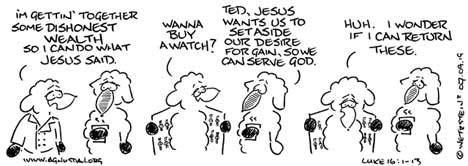Jesus said to his disciples:
A rich man once had a manager to take care of his business. But he was told that his manager was wasting money. So the rich man called him in and said, “What is this I hear about you? Tell me what you have done! You are no longer going to work for me.”
The manager said to himself, “What shall I do now that my master is going to fire me? I can’t dig ditches, and I’m ashamed to beg. 4I know what I’ll do, so that people will welcome me into their homes after I’ve lost my job.”
Then one by one he called in the people who were in debt to his master. He asked the first one, “How much do you owe my master?”
“A hundred barrels of olive oil,” the man answered.
So the manager said, “Take your bill and sit down and quickly write `fifty’.”
The manager asked someone else who was in debt to his master, “How much do you owe?”
“A thousand bushels of wheat,” the man replied. The manager said, “Take your bill and write eight hundred.”
The master praised his dishonest manager for looking out for himself so well. That’s how it is! The people of this world look out for themselves better than the people who belong to the light.
My disciples, I tell you to use wicked wealth to make friends for yourselves. Then when it is gone, you will be welcomed into an eternal home. Anyone who can be trusted in little matters can also be trusted in important matters. But anyone who is dishonest in little matters will be dishonest in important matters. If you cannot be trusted with this wicked wealth, who will trust you with true wealth? And if you cannot be trusted with what belongs to someone else, who will give you something that will be your own? You cannot be the slave of two masters. You will like one more than the other or be more loyal to one than to the other. You cannot serve God and money.
Luke 16: 1 – 13

What? I can imagine the disciples of Jesus struggling with this story. Is Jesus suggesting we learn to be dishonest with other people’s money? And yet we know from Jesus sayings about honesty and reliability with small things that he’s not heading us in that direction. Why has he set us up with this dissonant tale of a crook?
David Buttrick, in his book, “Speaking Parables”, opens up his interpretation of this parable by exposing our tendency to divide the world into good and bad people. We generally think we’re part of the virtuous side, with terrorists, thieves and murderers on the bad side. And yet the reality is that we’re living with mixed motives in a society that continually places us in compromising situations.
William R. Herzog II, in his book Parables as Subversive Speech: Jesus as Pedagogue of the Oppressed, places the manager, or steward, in the awkward position of making money for his boss through charging high interest rates. The debts of goods (olive oil and wheat) would have concealed mark-ups that paid for the life of luxury enjoyed by the property owner. Those renting their land to make a living for themselves were being forced to struggle to make ends meet, and would have resented the manager in his debt-collecting role. The pressure from landowner and lessees is perhaps what leads to this man contemplating the inevitability of a long slow death through hard labour (digging ditches) or poverty (begging).
So what is it that the manager does that connects with the Kingdom of God? I believe it’s something to do with restorative justice – the capacity to build relationships and systems that bring people together in ways that are better for all. The struggling farmers have had their debt reduced, though they would still be carrying a burden of interest. The landowner’s reputation for fairness was being restored in the eyes of his lessees. And the manager has his relationship with both restored, perhaps enough to keep his job.
Even though the whole system is dishonest, including the role of the manager, we’re seeing here the capacity to find a way to live in it that is just and wise. The manager may be dishonest but he’s also shrewd, astute, sharp, on the ball, perceptive, insightful, clever, cunning, sharp witted and canny. In short, the man is exercising the skills of entrepreneur.
In my work as Vision for Mission Advocate I’ve seen some good examples of relationship-building enterprise that fulfill what I think Jesus is on about here. Like Marty Richards, a guy in Brisbane who has developed EPM – Ethical Pest Management, building an income-generating business that is good news for Ali, an Afghan refugee who has come onto the staff. Marty’s currently developing a coffee roastery and cart business that will provide an income for other refugees who are struggling to make a new start in Brisbane. Coffee addicts from Brisbane are being asked to pay good money for a fair trade product that directly supports the reshaping of Brisbane’s economy around fairness for refugees. What he needs now is a group of investors who will take the risk with him, learning to use their money for the good of the community of forgotten people.
I also think of Sister Helen Prejean, the Catholic nun behind the story, Dead Man Walking. Helen, in her interview with Andrew Denton on Monday night, (Enough Rope, ABC), talked about the audacity of forgiving prisoners who had been condemned to death for the horrific crimes. Understandably, some of the families of the victims felt that the prisoners on death row did not deserve to have a confessor or spiritual support person. But Helen described justice as being about restoration rather than retribution. The capacity to address the pain and suffering experienced by victims and their families was essential for bringing humanity back into the dehumanizing prison system that makes people invisible. Offering forgiveness on God’s behalf, and on behalf of families who were not necessarily in a place to do so, was bringing a sense of restorative justice into the system of retribution symbolised by capital punishment.
Last week I watched Debbie Morris, the author of Forgiving the Dead Man Walking, speak on a video called Life Stories. Rob Harley from New Zealand interviewed Debbie, sharing with us her story of being one of the victims behind the story of the Dead Man Walking book and movie. Debbie’s capacity to forgive required not just a sense of good will but also clear thinking and a plan that would take her beyond her own needs for recovery. Her publication of the book, and the seminars that she runs, have become a way for her to build restorative justice that goes way beyond the original injustice.
So what will we do with this parable?
Personally, I’m committed to taking seriously Jesus’ direct teaching on faithfulness and honesty with small things and big things. I note however that Jesus is challenging us to go beyond reliability and integrity. He’s challenging us to consider ways in which our stewardship of money and property (for a limited only) can be used to build relationships. Yes, we live in a society that is focused on a user-pays system. We’re used to paying interest on our mortgages, and getting interest on our investments. But Jesus challenges us to develop social enterprises that subvert those assumptions. As we keep our eyes open for the normally invisible people in our networks, let’s pool our learning to carry out our cunning plans.
Other blogs relating to this passage:
Shawn Anthony at Lo-Fi Tribe on the Difficult Parable
Jim Wetzstein’s cartoon (below) at Agnus Day
David Ewart at Holy Textures
Will Deuel at Metholectionary
Pondering Pastor

